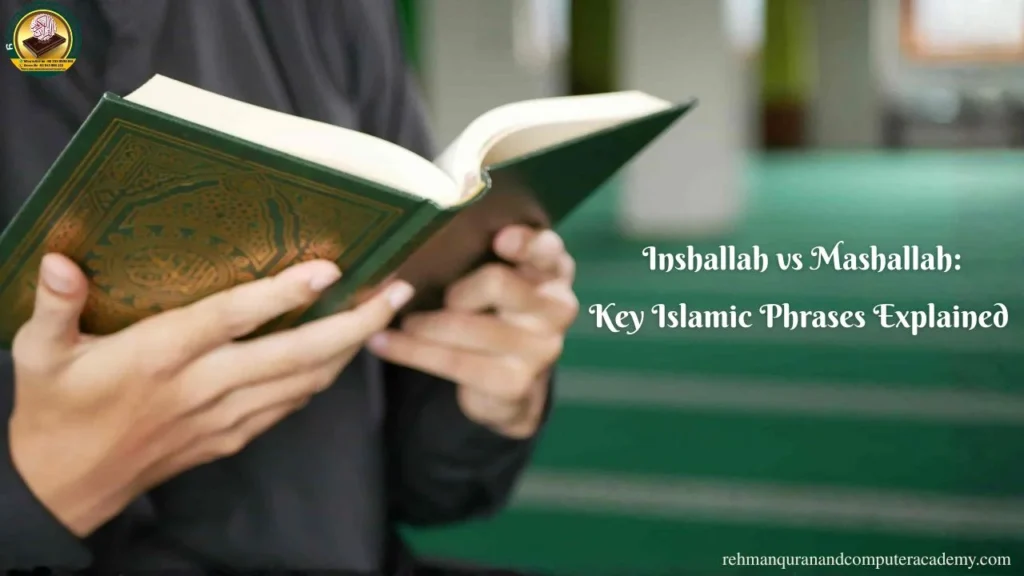
Origins of Inshallah and Mashallah in Arabic Islamic Tradition
Roots in the Arabic Word for Allah
The Arabic word Allah forms the base for many Islamic expressions. Inshallah comes from إن شاء الله, which literally means “if Allah wills.” Mashallah stems from ما شاء الله, meaning “what Allah has willed.” Both tie back to the name of God in Islam. Muslims repeat these to show sincerity and remembrance of Allah. The Quran uses Inshallah over 30 times, always linked to future events. This root in Allah keeps Muslims humble in speech.
Common Arabic Islamic Expressions in Daily Muslim Life
Muslims around the world greet each other with Islamic prayers like peace be upon you. Common Arabic phrases fill homes and streets. A parent says Mashallah when a child learns to recite the Quran. Friends say Inshallah before plans. These heard expressions remind everyone that all good things come from Allah. Even Muslims and Christians in Arabic areas share some, though meanings stay tied to Islamic faith.
Mashallah and Inshallah as Part of Broader Arabic Phrase Usage
Mashallah and Inshallah join other common Arabic Islamic expressions like Subhanallah or Alhamdulillah. People will use them in the same breath. After something good happens, Mashallah protects from jealousy. Before any action for which a person hopes success, Inshallah shows trust in Allah wills. This mix creates moments of remembrance every day.
Inshallah Meaning and Pronunciation
Literal Breakdown of Inshallah – Allah Wills
Inshallah meaning breaks into three parts: “in” (if), “sha’a” (willed), and Allah. So it says “if Allah wills.” Muslims use it for anything ahead in time. Inshallah is used for future plans, big or small. It serves as a reminder that only Allah controls outcomes.
Correct Pronunciation of Inshallah for Non-Arabic Speakers
Say it as “in-shaa-Allah” with a soft “sh” and stress on the last part. The “aa” sounds long, like in “father.” Practice slowly: in – shaa – Allah. Arabic pronunciation matters, but Allah accepts effort. Muslims teach kids early so the Arabic phrase flows naturally.
When to Say Inshallah in Islamic Contexts
When to say Inshallah comes right after any future talk. “I will visit tomorrow, Inshallah.” Or “We meet next week, Inshallah.” The Quran commands it in Surah Al-Kahf. Skip it, and plans sound proud. Use this phrase to stay humble and gain blessings.
Mashallah Meaning and Pronunciation
Literal Breakdown of Mashallah – What Allah Has Willed
Mashallah meaning splits into “ma” (what), “sha’a” (has willed), and Allah. Full form: “what Allah has willed.” It points to something that has happened by Allah’s power. Saying Mashallah gives gratitude and appreciation.
Correct Pronunciation of Mashallah with Examples
Sound it “maa-shaa-Allah.” The first “maa” is short, then long “shaa,” end with Allah. Try: “Your new home is beautiful, Mashallah.” Or “Mashallah, the baby sleeps well.” Arabic language speakers roll the “sh,” but clear intent works.
When to Say Mashallah to Avoid Jealousy
When to say Mashallah is the moment you see something good. A pretty garden? Mashallah. Healthy child? Mashallah. It blocks the evil eye and jealousy. Mashallah is often the first word after praise. Mashallah can be used alone or with details.
Difference Between Inshallah and Mashallah
Core Difference: Future Intent vs. Present Praise
The difference between Inshallah and Mashallah lies in time. Inshallah looks forward; Mashallah looks at now. One hopes, one thanks. Both keep Allah at the center.
Inshallah for Plans and Mashallah for Blessings
Inshallah fits promises: “I start work Monday, Inshallah.” Mashallah fits results: “The exam went well, Mashallah.” Muslims switch based on the moment.
Common Mistakes Muslims Make Between the Two
Some Muslims mix them. Saying Mashallah for a future event sounds odd. Or Inshallah after success misses gratitude. Practice fixes this fast.
Mashallah vs Inshallah vs Alhamdulillah
Alhamdulillah Meaning – Praise Be to Allah
Alhamdulillah means “all praise to Allah.” It covers positive and negative times. End with Alhamdulillah after any story.
Situations for Alhamdulillah vs Mashallah vs Inshallah
Safe trip? Alhamdulillah. New car? Mashallah. Travel tomorrow? Inshallah. Each fits its slot.
Combining All Three in Everyday Islamic Speech
“I leave for school, Inshallah. I arrive safe, Alhamdulillah. The day was good, Mashallah.” Muslims flow through them daily.
Mashallah vs Inshallah vs Bismillah
Bismillah Meaning – In the Name of Allah
Bismillah starts with “in the name of God.” Full: “In the name of Allah.” Begin meals, travel, or work with it.
Starting Actions with Bismillah and Ending with Mashallah
Eat: Bismillah, finish: Mashallah. Drive: Bismillah, arrive: Mashallah. Bookends of remembrance.
Inshallah in Planning and Bismillah in Execution
Plan: “Trip next month, Inshallah.” Start: Bismillah. Pair them for full circle.
Islamic Phrases for Everyday Use
Subhanallah for Awe and Wonder
See stars? Subhanallah. Perfect Quran recitation? Subhanallah. It means Allah is free from flaws.
Astaghfirullah for Seeking Forgiveness from Allah
Mistake made? Astaghfirullah. It asks forgiveness from Allah at once.
Jazak Allah Khair as a Response to Kindness
Help given? “Jazak Allah Khair” – “may Allah reward you with good.”
Inshallah and Mashallah Meaning in Quran Recitation and Translation
Inshallah in Quran with Translation Contexts
Quran verses with Inshallah teach trust. Read with translation to feel the weight.
Mashallah in Online Quran Classes and Tajweed Practice
Student reads well? Teacher says Mashallah. Keeps jealousy away in class.
Using Both Phrases During Quran Memorization (Hifz)
Memorize new page: “Finish today, Inshallah.” Recall perfect: Mashallah. Builds habit.
Role of Inshallah and Mashallah in Islamic Education
Teaching Inshallah in Basic Norani Qaida and Arabic Course
Kids start with Basic Norani Qaida to learn Arabic letters. Teachers say Inshallah right away: “You will read the next line, Inshallah.” This plants sincerity early. In the Arabic Course, students practice Arabic pronunciation of إن شاء الله. They see Inshallah meaning as trust in Allah wills. Muslims use it for every small goal, like Inshallah finishing homework. The phrase is a reminder that effort needs Allah’s help. Common Muslim kids repeat it before tests. Use this phrase builds habit in Islamic faith.
Mashallah in Kalimas & Namaz and Basic Salah Course
In Kalimas & Namaz, children memorize six beliefs. After perfect recall, the teacher says Mashallah. This saying Mashallah shows gratitude and appreciation for something good. In Basic Salah Course, a child stands straight in prayer. Family members reply Mashallah to protect from jealousy. Mashallah meaning fits here as “what Allah has willed.” Mashallah can be used after any correct step. Muslims teach it to appreciate things like beauty in worship. Mashallah is often the word that ends class praise.
Integration in Hadith & Fiqh Studies and Special Islamic Courses
Hadith & Fiqh Studies quote the Prophet using Inshallah. Students note when to say Inshallah for promises. Special Islamic Courses mix stories where Mashallah guards blessings. Arabic Islamic texts show both as common Arabic Islamic expressions. People will use them in debates on rules. Muslims around the world link remembrance of Allah to daily lessons.
Practical Examples of Inshallah and Mashallah
Inshallah in Family Plans and Travel
A mother plans dinner: “We eat at seven, Inshallah.” Inshallah is used for future events, even simple ones. For travel, dad says, “We reach by noon, Inshallah.” Arabic phrase adds peace. Say Inshallah keeps everyone calm if delays happen. Difference between Inshallah and Mashallah shows here – one for ahead, one for now.
Mashallah for Children’s Achievements and Health
Child scores high? “Mashallah, smart work.” Mashallah is used to praise without jealousy. Baby walks first step? Mashallah. Said when witnessing something lovely. Recognizing that all good things come from Allah. Islamic phrases explained through real moments.
Wallah and Khair Inshallah in Casual Muslim Conversations
Friends chat: “I swear, Wallah, it’s true.” Then, “Things get better, Khair Inshallah.” Khair means good. Common Islamic mix keeps talk light. Muslim expressions flow easy.
Frequently Asked Questions About Inshallah and Mashallah:
What is the difference between Inshallah and Mashallah?
Inshallah and Mashallah shows Inshallah for future hopes like “Allah wills” while Mashallah praises “what Allah has willed.” Difference between Inshallah and Mashallah keeps sincerity in Islamic faith. Muslims sound very similar but use Islamic right for remembrance of Allah.
When should you say Inshallah and Mashallah in daily life?
Say Inshallah for plans “Inshallah is used for future” action for which a person hopes. When to say Mashallah sees “something good happens” to stop jealousy. Mashallah is often “said when witnessing something” beautiful.
What does Inshallah mean in Islam?
Inshallah meaning “إن شاء الله” or “شاء الله” literally means “if Allah wills.” Phrase is a reminder of Allah control. People will use it daily for moments of remembrance.
What does Mashallah mean in Arabic and when is it used?
Mashallah meaning “ما شاء الله” or “مَا شَاءَ” literally means “what god has willed.” Mashallah is used to express gratitude for “something that has happened.” Used by Muslims to appreciate things like beauty.
Can non-Muslims or Christians say Mashallah?
Yes, used by muslims and christians in Arabic culture. Muslims and Christians in Arabic say it for gratitude. Common Arabic welcome all who learn Arabic.
How do you reply when someone says Mashallah?
Reply “Alhamdulillah” to end with Alhamdulillah and show thanks. Or “Jazak Allah Khair” “may Allah reward” kindness. Keeps gratitude and appreciation flowing.
Is it wrong or impolite to say Inshallah?
No, like Inshallah honors name of god. Muslims use it with sincerity for blessings. Serves as a reminder in positive and negative times.
What is the difference between Alhamdulillah, Inshallah and Mashallah ?
Inshallah hopes ahead, Mashallah praises now, Alhamdulillah gives gratitude always. Islamic phrases explained as muslim expressions. One of the most common Islamic terms and meanings.
Why are Inshallah and Mashallah such common Arabic Islamic phrases?
Common Arabic Islamic expressions protect from jealousy and build remembrance. Muslims around the world use this phrase in Islamic prayers. Important Arabic Islamic for everyday Islamic language guide.
What is the significance of saying Inshallah and Mashallah in Muslim culture?
Arabic Islamic expressions teach “recognizing that all good things” from Allah. Saying Mashallah blocks evil eye, say Inshallah shows trust. Common Muslim habit with Wallah, Subhanallah, Astaghfirullah, Bismillah for forgiveness from Allah, “peace be upon” all, “god but allah,” “there is no god” but Allahu. Heard expressions in Quran, recite with pronunciation, Arabic phrase, Arabic word, Arabic expression, Arabic pronunciation, Arabic language. Express gratitude, used to express gratitude. Mashallah can be used anywhere something good.
Learning Inshallah and Mashallah Through Online Quran Classes
Quran Reading with Inshallah for Future Goals
In Quran Reading, a student aims for one page daily. Teacher says, “Complete it, Inshallah.” Inshallah pushes gentle hope. When to say Mashallah waits for success. Islamic terms and meanings grow with practice.
Quran with Tajweed and Mashallah for Correct Recitation
Quran with Tajweed demands rules. Perfect “madd”? Mashallah. Used to express gratitude for clear voice. Mashallah protects the skill. Arabic expression fits recite sessions.
Read Live Quran Sessions with Proper Phrase Usage on Rehman Quran Acedmy
Read Live Quran brings voices together. Start with Bismillah, plan with Inshallah, end with Mashallah. Islamic language guide in action. Arabic Islamic expressions make classes warm. Muslims leave smiling, full of remembrance.
Rehman Quran and Computer Academy offers online classes worldwide, with dedicated support from Pakistan and UAE. Reach us anytime at +92 543 546 001, +92 333 0590 681, +92 543 590 222 (Pakistan), or +971 556 695 391 (UAE). Email inquiries to Contact@rehmanquranandcomputercademy.com for course details or free trials.

